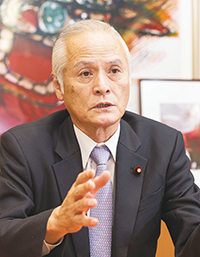
Interview with Koichi Yamamoto, Chairperson, LDP's Research Commission on Environment and Global Warming Countermeasures
The 21st Conference of the Parties to the United Nations Framework Convention on Climate Change (COP21) is coming up at the end of this year and is scheduled to adopt a new framework for the reduction of greenhouse gas emissions after 2020. In preparation, the Party's Research Commission on Environment and Global Warming Countermeasures (Chairperson: Koichi Yamamoto, member of the House of Representatives) formulated "emergency recommendations" and submitted them to the government. Prime Minister Shinzo Abe has already indicated his resolve to "be a leader in global climate change policy," and we spoke with Chairperson Yamamoto about his commitment to the global environment.
Q: International negotiations are underway for the adoption of a new framework at COP21.
Koichi Yamamoto, Chairperson of Research Commission on Environment and Global Warming Countermeasures: COP21 is the most important conference since COP3 was held in Kyoto in 1997. China and other countries which, at the time, were considered to be "developing countries" did not participate in COP3, but the new framework being negotiated for COP21 has the explicit goal of bringing developing countries in, and within this context it is revolutionary. Thus far, it is crucial that Japan be at the table and lead the negotiations.
Japan has said it wants to be a "leading country on the environment," and this "aspiration," more so than the numbers themselves, is significant as a target for our reduction of greenhouse gases in FY2030, and something we can be proud of. I think we need to ensure that other countries understand this, for it is only then that we will be respected and be able to maintain a strategic position within the wider context of diplomacy and foreign relations.
Q: The government's plan calls for a "26% reduction from 2013 levels." The Research Commission on Environment and Global Warming Countermeasures recommended "setting a high target that is on par with the EU and USA and will earn international respect."
Yamamoto: The recommendations did not state an explicit target number because we wanted to avoid political risks, but they were formulated in a way that communicates the Research Commission's intent. Last year, an analysis by the International Energy Agency (IEA) found that Japan will be able to achieve a 24% reduction simply by implementing all of the measures that are currently available. This number therefore represents the minimum that is respectable. We appreciate the fact that the government proposal has attempted to fully incorporate the Research Commission's recommendations.
Two years ago, Japan advocated using "2005" as the base year for comparisons. I think it is best not to change that, because doing so could harm our international credibility.
We are seeking an explanation from the government, and will continue to discuss this in the Research Commission.
Q: Do you think the reduction target can be achieved?
Yamamoto: I think that Japan is capable of significant innovation in environmental technology. For example, sales of hybrid vehicles continue to grow, though their impact was still not widely appreciated at the time of COP3. The world's automakers were not happy when the United States adopted the "Muskie Act" for the purpose of preventing air pollution, but the Japanese automotive industry took up the challenge and was able to meet and surpass the targets. That was something that required ambition and will.
I think it is probably hydrogen, as a clean energy, that has the greatest potential. We will be able to reduce our dependency on nuclear power if fuel-cell vehicles continue to spread and hydrogen becomes established as the energy that drives society.
However, given the time remaining between now and 2030, I think we will need to make people understand that, conditional upon being able to ensure safety, it will be necessary to restart our nuclear reactors while we make the transition to the next generation of energy.
Q: Environment is one of the main items on the agenda at the G7 summit scheduled for June.
Yamamoto: We heard a lot of different opinions in the course of putting together the Research Commission's recommendations. However, it is no longer possible to ignore environmental issues either in our daily lives or in our business activities, and the government cannot be seen to be anything less than positive and proactive in its environmental policies. Members of the Party may have some differences in their positions, but all of us are united in our desire to support the Abe government.
I also chair the Party's Subcommittee on Basic Fishing Policy, and we hear reports about abnormal behavior of fish. This is something that did not occur in the past, and it underscores, for me, the fact that our environment is changing. Fish and animals may be more sensitive to environmental change. We are also seeing an increase in torrential rains and unseasonal typhoons. This too says that it is time for us to get serious about our environment.
Environmental problems are not something that can be quickly solved by taking drastic measures. That is why it is crucial that we pay attention to the details, making progress step-by-step so that today is little bit better than yesterday and tomorrow better than today.










